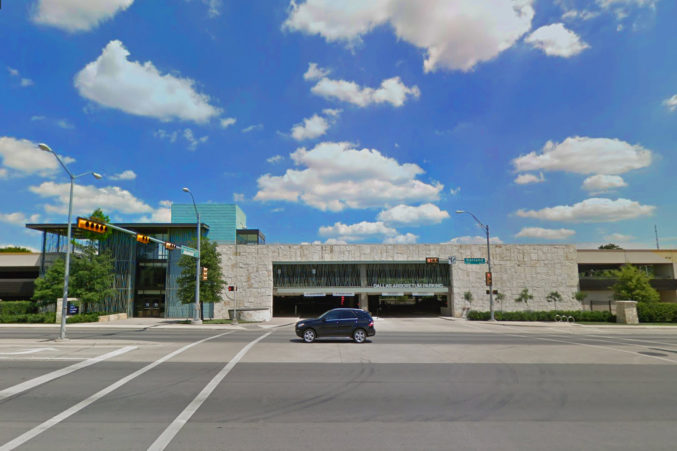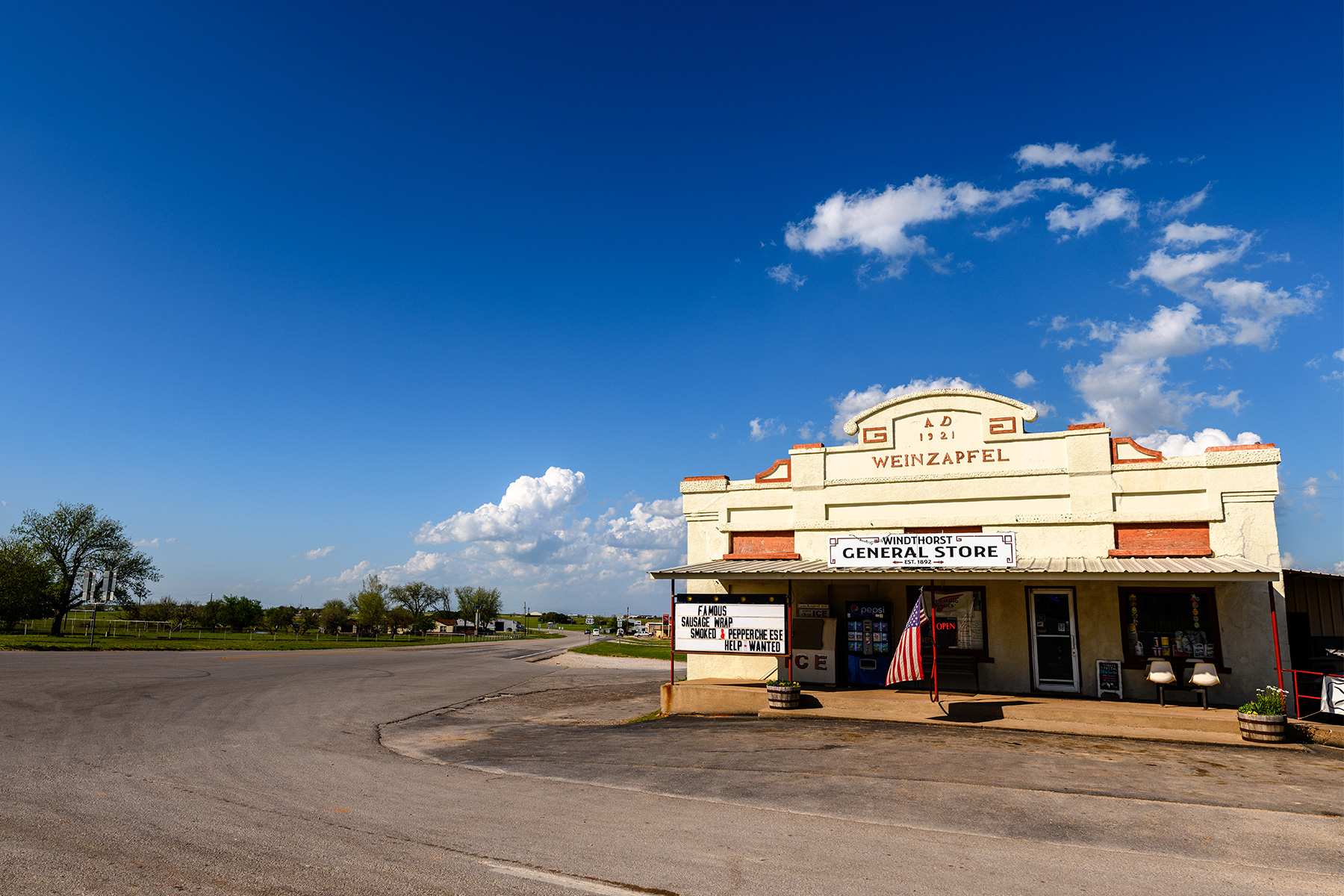Lawyers from the Dallas firm McCall, Parkhurst & Horton made the familiar two-hour drive out Highway 281 on May 15, 2015. They were headed to the tiny town of Windthorst, a dairy farming community with a population of about 409 people that was founded in the late 19th century by German settlers. Only three things distinguish Windthorst from all the other towns that dot the wide and flat landscape south of Wichita Falls: its handsome Catholic church; its billing as the “Dairy Capital of North Texas”; and the fact that, over the last 20 years, Windthorst has issued hundreds of millions of dollars in tax-exempt bonds for organizations across Texas.
The McCall lawyers made the trip that day to work on the town’s latest deal—a $35 million tax-exempt bond to refinance the construction loan for the Dallas Arboretum’s parking garage, which it built in 2014. A couple of weeks earlier, the lawyers placed ads in the local paper announcing a public meeting, and they arranged a meeting of the volunteer members of the Windthorst City Council, a rotating group of citizens whose families have known each other for generations. Windthorst doesn’t have a city hall, so the Council met at the city’s credit union. After a brief presentation from the lawyers, council members signed some documents that created a legal entity, the Red River Cultural Facilities Finance Corporation, for the sole purpose of refinancing the Arboretum’s debt.
Here’s how such a tax-exempt bond issuance works: if the prime rate stood at 4 percent, a construction loan from a bank might carry 6 percent interest. Selling bonds is a way for the borrower to reduce its rate on the loan by transferring the debt to another investor. The interest rate on a tax-exempt bond may be as low as 3 percent, but because the investor doesn’t have to pay taxes on the interest income it receives from the borrower, the effective yield of the investment may be greater than it would be on a taxable bond with a higher rate. The bond purchaser still makes a good return, and the borrower reduces its cost of servicing the debt.
Greg Vieth, who owns a crop-spraying business and whose turn it is to serve as mayor of Windthorst, admits that the precise mechanisms that allow Windthorst to issue so much public debt lie beyond his grasp. He says the lawyers assured the citizens of Windthorst that their involvement was a formality—a “pop around,” as Vieth puts it. In exchange for each bond issue, the town of Windthorst receives a fee ranging from about $10,000 to $30,000, depending on the size of the bond. “It’s a win-win for us,” Vieth says.
And for 20 years, the city’s role in what’s known as “conduit financing” has seemingly been a win-win. Since 1998, according to public records, Windthorst has participated in bond issues totaling at least $230 million. They have included projects for TCU ($40 million), Jesuit College Preparatory School of Dallas ($11 million), the Hockaday School ($18 million), and Parish Episcopal School ($5 million). The $230 million total includes only bonds sold on the open market, deals that are public records. The Arboretum deal was done through a private placement.
For each bond issue, the process was the same. The lawyers notified the town that they had a new deal and then took care of the paperwork, following legal protocols for the posting of notices. Windthorst’s public officials saw their town’s involvement as, essentially, a technicality. Raymond Van Burger, who is listed as an incorporator on the Arboretum bonds, says Windthorst felt fortunate. “It is a small city,” Van Burger says. “We were financially in trouble. We were able to pay our bills. It helped us.”

The fees were used to pave roads, maintain Windthorst’s one park, and service the town’s backhoe. The deals didn’t always work. But when two assisted living facilities funded through Windthorst’s Red River Health Facilities Finance Corporation went bankrupt and were unable to repay its bonds, the only fallout for the town was a torrent of paperwork that poured into longtime city secretary Debbie Schroeder’s living room. “When I’m not city secretary anymore, they are going to have to build an office,” jokes Schroeder, who handles all city business from her home.
Windthorst’s rise in the field of conduit financing started in the late 1990s. That’s when changes in tax law allowed municipalities to issue tax-exempt bonds for projects outside their city limits as long as the projects were also approved by the host municipality. The change was intended to give educational and health institutions access to cheaper capital. If the municipality issuing the bonds and the institution’s host city agreed that the projects being funded by the bonds served some public benefit, everything was kosher.
Windthorst popped up on McCall’s radar after Jesuit began looking to fund a campus expansion in 1998. To finance the improvements with tax-exempt bonds, the lawyers explained, the school would need to find a Texas town willing to participate. David Berend, Jesuit’s CFO, knew the perfect place. He grew up in Windthorst, and when he spoke with some of his neighbors back home, they were open to the idea. The bond attorneys assured the dairy farmers that they would be protected from any fiscal fallout, and in 1998 the Windthorst City Council made its first bond issue through the Red River Educational Facilities Finance Corporation.
Over the years, the town became one in a stable of municipalities that McCall has used to issue bonds. The law firm kept it simple. It arranged all the meetings, posted all the notices in the papers, and made sure that the process complied with federal requirements. To show appreciation, the residents of Windthorst sent the lawyers Christmas cards and cookies around the holidays.
David Berend, Jesuit’s CFO, knew the perfect place. He grew up in Windthorst, and when he spoke with some of his neighbors back home, they were open to the idea.
“As these programs evolved, [nonprofit and educational institutions] knew that Red River was an organization that would review or take into account and consider issuing the debt,” says Jeff Leuschel, a partner with McCall. Leuschel explains that the city of Windthorst is under no obligation to make any payments and does not pledge its credit in the issuance of the bonds.
But the nature and the timing of the deals are curious. And, at least with the Arboretum bond issuance, there’s a question about how the money was used. A look at the formation documents for all the Red River entities reveals that the boards of directors and incorporators are a rotating cast of familiar names and family members (sometimes with their names misspelled). These people are supposed to kibosh any bad deals—issuers that may not be able to pay back debts or that don’t qualify for tax-exempt status. That sort of oversight isn’t what folks from the town talk about.
“Every time there was a school or a college that wanted to spend a couple of million dollars, they would come up here and use Windthorst,” Van Burger says. “We were getting 10 or 15 thousand—which really got us out of the hole. They were giving us a certain amount of money to say it is OK to get them the loan, a little cheaper tax rate, to be sure. And we had to sign the paperwork and stuff, and I don’t really know what all the obligation was. I know if they went bankrupt, we had no obligation on it. I don’t understand the whole thing because the lawyers explained it. You have to be a lawyer to figure it all out.”
Attorneys familiar with the ins and outs of municipal bond regulations, contacted by D Magazine, said that using Windthorst as a conduit financing vehicle isn’t nefarious. Still, McCall lawyers seem to have played a little fast and loose with the rules. For example, a posting in the Dallas Morning News classified section announcing that the city of Dallas would hold a required hearing to consider allowing the Red River Cultural Education Facilities Finance Corporation to issue the Arboretum bond appeared in the paper a day before the corporation’s formation documents were filed with the Texas secretary of state. How can a city hold a hearing about a corporation before it is even formed?
Then there is the concern that public officials in Windthorst weren’t properly advised with regard to their role in the bond deals. Although they had their counsel review the first bond issue, over the years they increasingly became reliant on McCall to assure them that deals were financially solid and all the participants in the transaction were up to snuff. Nonetheless, boilerplate language in the bond-issuing documents states that the law firm has “not independently investigated or verified any records, data, or other material relating to the financial condition or capabilities of the Issuer or [the borrower].” As mentioned earlier, two of the entities that received funding via Windthorst’s Red River Health Facilities Financial Corporation did go bankrupt. Those bond holders are now locked in legal disputes with the owners of the defunct facilities.
Another question about Windhorst’s role in conduit financing involves a Texas statute that says that municipalities must lie within counties with a population of 300,000 or more to establish the finance corporations that can issue bonds. Windthorst straddles two counties with a combined population of about 20,000. Leuschel says there are exemptions to this statute, but when asked what they are, he said they were too legally complicated to explain.
There is another way Windthorst could find itself more exposed than its public officials realize. The reason both Windthorst and the city of Dallas are required by federal law to post and hold public meetings to approve the issuing of bonds is that the public entities must establish that the bonds meet the criteria for tax exemption. The cities must verify that the entity receiving the bond financing is spending those funds on projects that meet the federal criteria for tax exemption. For example, in the case of the Arboretum bond, this means that the parking garage and Children’s Garden must be used primarily for the purpose of “cultural education.” The Children’s Garden would fit that bill. But what about the 1,150-space parking garage?

The garage was built after a heated community fight. In 2014, as plans for the new Children’s Garden moved ahead and the Arboretum approached 1 million annual visitors, the nonprofit wanted to boost attendance by 4 percent per year. To do so, it said, it would need to expand parking. Initially, the city of Dallas indicated it would hand over a corner of White Rock Lake Park known as Winfrey Point to create a parking lot for the Arboretum, but nearby residents mobilized against the plan. Eventually, the Arboretum decided to build the garage on the other side of Garland Road, connecting it to the main campus with a pedestrian tunnel.
The project was expensive. And when the Arboretum found itself staring at a hefty chunk of long-term debt, its financial advisers knew just whom to call.
Arboretum CEO and president Mary Brinegar admits that she had never heard of Windthorst before the city came to the Arboretum’s rescue. McCall took care of all the arrangements. During a June 1, 2015, briefing of the Dallas City Council’s Budget, Finance, and Audit Committee, city staff assured council members that Dallas’ involvement was a formality, with no financial obligation or liability falling to the city. They, like Windthorst, were simply supplying the appropriate municipal cover for a tax-exempt bond deal between the Arboretum and Amegy Bank of Texas, the Houston financial institution that had agreed to purchase the bonds.
Arboretum CFO Rebecca Billings wrote in an email that the debt remains with Amegy, and the Arboretum has made its payments in a timely manner (back-of-envelope math suggests that works out to about $6,500 per day). But Billings also says that the garage is used to handle parking not only for the Children’s Garden but for concerts and weddings, which generate a significant portion of the Arboretum’s revenue. It’s possible that these uses of the garage could create a problem for the Arboretum—and everyone else involved with the tax-free bond.
The Internal Revenue Service cannot comment on a specific case, but a spokesperson did provide general information about the extensive rules regulating tax-exempt bonds. One of those rules requires that “all bonds are payable solely out of revenues and receipts derived from the leasing or sale of its projects.” The Arboretum says that it does not service the debt on the parking garage solely through parking receipts. That could be one area of concern.
Another possible hiccup could be caused by the IRS rules that govern the use of facilities built with tax-exempt bonds. No more than 10 percent of such a property may be used for a trade or business activity that is considered private. The Arboretum says the garage is used for its Thursday Night Concerts and other private events, such as weddings, but it’s impossible to tell whether those activities exceed 10 percent of the garage’s use because the Arboretum says it doesn’t separately track the parking in the garage and the parking on its older surface lots. If 10 percent of the garage’s use is by private businesses, a “change in use” would occur, and, by IRS rule, “the bonds are considered to be taxable as of the date of issuance, unless an appropriate remedial action is taken.”
If, for whatever reason, the IRS finds that an issuer of a tax-exempt bond does not qualify for the exemption, it forces the borrower to repay the taxes on the debt, plus interest. In addition, penalties may be levied not only against the borrower but against all the entities and individuals involved in the transaction, including “investment bankers and their counsel, issuers and their counsel, conduit borrowers and their counsel, financial advisors, feasibility consultants and engineers, and other persons.” That means Windthorst.
Then there is the question of what would happen if the Arboretum ever failed to pay Amegy Bank. The Arboretum’s 2017 financial audit states that the bond is collateralized by “certain real property,” but the city of Dallas owns the land under the parking garage and the Arboretum’s acreage. When asked about this, Billings said the bond is collateralized not by property but by “pledges not yet paid on the Children’s Garden capital campaign.” So in the case of a hypothetical default on the bond, the Arboretum would need a bailout from those pledged donors.
For now, the residents of Windthorst have more important things than their bonds to worry about. Like other current and former Windthorst officials who spoke to D Magazine, former mayor Sue Steinberger, who signed off on the very first Windthorst bond issue, admits it has been a long time since she thought about the odd bond deals her little city got involved in. But Steinberger wants to make it clear that the income the city received didn’t make its citizens rich; it just helped people survive.
“It’s the pits, let me just tell you,” Steinberger says. “We’ve been in the dairy business for 60 years, and it has never been this bad.”
These days, the dairy farmers can hardly cover the cost of production. To make ends meet, Steinberger says, they have to get creative. They do their own trucking, grow their own feed for the cows. And, sometimes, they issue millions of dollars in tax-exempt bonds.






